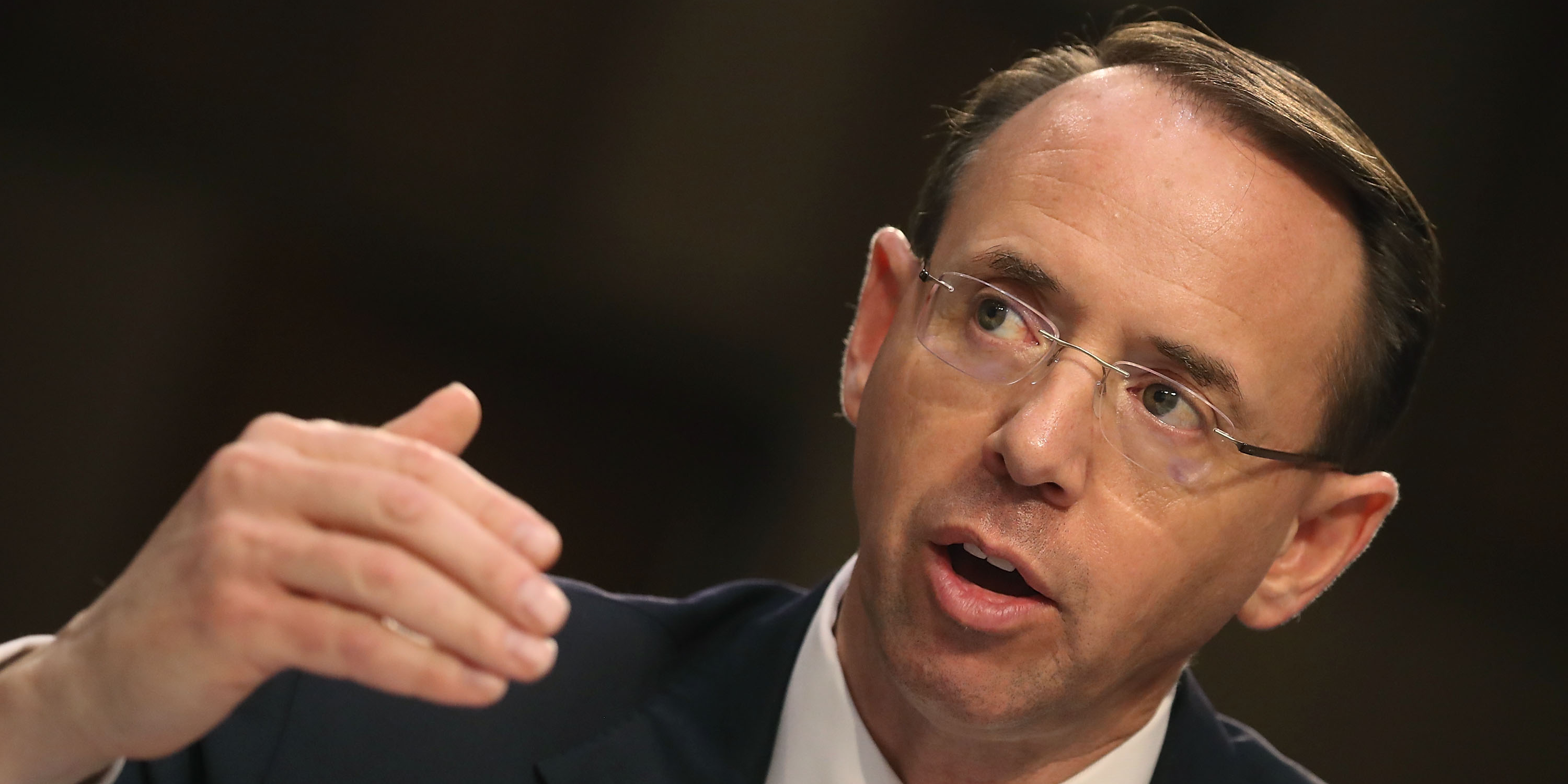- Deputy Attorney General Rod Rosenstein last year discussed using the 25th Amendment to remove President Donald Trump from office and wearing a wire to record his conversations with him, The New York Times reported Friday.
- Rosenstein is said to have first raised these ideas in the spring of 2017 after Trump revealed classified intelligence to Russian officials in an Oval Office meeting and fired James Comey as FBI director.
- In a statement to The Times, Rosenstein denied ever having considered an effort to invoke the 25th Amendment or record Trump.
Deputy Attorney General Rod Rosenstein last year discussed using the 25th Amendment to remove President Donald Trump from office and wearing a wire to secretly record him, The New York Times reported Friday.
Rosenstein first raised the issues in the spring of 2017 with officials in the Department of Justice and the FBI, The Times said, citing sources who were briefed on the conversations or on memos about Rosenstein written by FBI officials such as former Deputy Director Andrew McCabe.
A Washington Post report published later Friday described a source as saying that Rosenstein’s comment about wearing a wire was made sarcastically after McCabe pushed for the DOJ to investigate Trump. The newspaper said the source was at the meeting where McCabe’s memos say the conversations about the 25th Amendment and recordings took place, though the person said Rosenstein didn’t raise the possibility of invoking the amendment.
The source described Rosenstein’s comment as along the lines of, “What do you want to do, Andy, wire the president?”
A contemporaneous memo of the meeting created by Lisa Page, then an FBI lawyer, also did not mention anything about Rosenstein bringing up the amendment, The Post said, citing a person familiar with Page's account.
While Rosenstein does not have the authority to invoke the 25th Amendment - that power belongs only to Cabinet officials - he mentioned to McCabe that he might be able to persuade Attorney General Jeff Sessions and the White House chief of staff, John Kelly, who are both members of the Cabinet, to lead an effort to remove Trump from office, The Times reported.
In spring 2017, Trump revealed classified intelligence to Russian officials in the Oval Office and fired James Comey as FBI director. Comey has detailed interactions with Trump in which he refused Trump's request for his loyalty and declined to drop an investigation into Michael Flynn, the former national security adviser who later pleaded guilty to lying to the FBI.
In justifying Comey's firing, Trump cited a memo written by Rosenstein that criticized Comey's handling of the Hillary Clinton email investigation, reportedly leading Rosenstein to feel that Trump had used him.
In a statement to The Times, Rosenstein denied that he discussed plans for removing Trump or considered wearing a wire.
"The New York Times's story is inaccurate and factually incorrect," he said. "I will not further comment on a story based on anonymous sources who are obviously biased against the department and are advancing their own personal agenda. But let me be clear about this: Based on my personal dealings with the president, there is no basis to invoke the 25th Amendment."
Rosenstein doubled down on that denial in another statement to NBC News on Friday night:
"I never pursued or authorized recording the President and any suggestion that I have ever advocated for the removal of the President is absolutely false."
Rosenstein is a frequent target for Trump

Rosenstein and Sessions have been frequent targets of Trump's ire since the special counsel Robert Mueller was tapped in May 2017 to oversee the FBI's Russia investigation.
Mueller is tasked with investigating Russia's interference in the 2016 election and whether members of Trump's campaign colluded with Moscow to tilt the race in his favor. Mueller is also building an obstruction-of-justice case against the president that stems from his decision to oust Comey.
Rosenstein has been overseeing the investigation since Sessions recused himself in March 2017, after he was found to have failed to disclose meetings he had during the campaign with Sergey Kislyak, then Russia's ambassador to the US.
Trump often rails against Rosenstein, Sessions, and the Justice Department at large, according to various media reports. At one point, he is said to have wondered why "my guys" at the "Trump Justice Department" weren't doing more to shield him from Mueller.
His anger toward Rosenstein ratcheted up another notch in April after it emerged that Rosenstein greenlit an FBI raid on the property of Michael Cohen, Trump's longtime lawyer.
Cohen has since pleaded guilty to eight charges related to tax evasion, bank fraud, and campaign-finance violations. He is now cooperating with prosecutors in the Southern District of New York, as well as Mueller's team.
Following the Cohen raid, Trump privately began wondering whether he should fire Rosenstein, The New York Times reported earlier this year.
"He takes the Russia stuff as a political hit job," the news website Axios quoted a source close to Trump as saying in April. The Cohen raid "was a personal affront" and "the red line," this person added.
Some of Trump's legal advisers have also argued that they have a strong case to support Rosenstein's firing, according to CNN.
According to the report, they believe they can prove that Rosenstein has overstepped his authority and that he is conflicted because he is also a witness in the Russia investigation, given that he recommended Trump fire Comey last year.
The White House did not immediately respond to a request for comment on The Times' Friday report.
